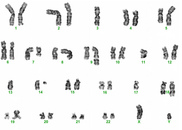pre pregnancy counselling

Many pregnancies are unplanned and by the time you know you are pregnant, it may be too late to modify certain risk factors.
You may have health issues that may impact on your future pregnancy. If you are planning to embark on a pregnancy and wish expert advice on either your general health or specific health problem, I am happy to offer specialist advice.
NONINVASIVE PRENATAL TESTING (NIPT) FOR DOWN'S SYNDROME (At Kph only)

This is a screening test that is available for all pregnant women after 10 weeks of pregnancy to check for common chromosomal abnormalities in the baby including Down's syndrome. It involves a single blood test from the mother anytime after 10 weeks. The results are available in about 10 days' time. The test analyses the baby's cells which are present in the mother's blood. The pick-up rate for Down's syndrome is 99%.
Trisomy 18 (Edward's syndrome) and Trisomy 13 (Patau syndrome) are other common chromosomal abnormalities which can be associated with major birth defects in the baby. Very few babies with these abnormalities survive beyond the first year of life. This prenatal test can also pick up these Trisomies. The pick up rate for Trisomy 18 is 97% and Trisomy 13 is 80%. In addition, NIPT test can also analyse the X and Y chromosomes of the baby if the woman chooses to do this.
As the test is highly accurate, it avoids the need for invasive testing in the vast majority of women. It is particularly useful for women with IVF pregnancies and twin pregnancies, thereby significantly minimising the risk of miscarriage by invasive testing. At the moment, the test is not available for women carrying more than 2 fetuses.
Trisomy 18 (Edward's syndrome) and Trisomy 13 (Patau syndrome) are other common chromosomal abnormalities which can be associated with major birth defects in the baby. Very few babies with these abnormalities survive beyond the first year of life. This prenatal test can also pick up these Trisomies. The pick up rate for Trisomy 18 is 97% and Trisomy 13 is 80%. In addition, NIPT test can also analyse the X and Y chromosomes of the baby if the woman chooses to do this.
As the test is highly accurate, it avoids the need for invasive testing in the vast majority of women. It is particularly useful for women with IVF pregnancies and twin pregnancies, thereby significantly minimising the risk of miscarriage by invasive testing. At the moment, the test is not available for women carrying more than 2 fetuses.
EARLY PREGNANCY SCANS
Pregnancy can be an anxious time for many women. The early part of pregnancy can also be a time with complications and difficulties. If you are experiencing a problem in early pregnancy like bleeding or pain, or simply want reassurance, you can request a consultation with me for early pregnancy scan and advice.
Pregnancy can be an anxious time for many women. The early part of pregnancy can also be a time with complications and difficulties. If you are experiencing a problem in early pregnancy like bleeding or pain, or simply want reassurance, you can request a consultation with me for early pregnancy scan and advice.
Copyright: Priscilla Devaseelan 2023
